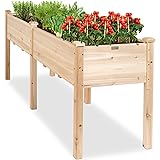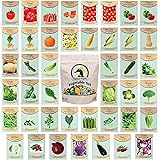JERIA 8×4×1ft Raised Garden Bed with Support Rods,Galvanized Raised Garden Bed Kit Outdoor Metal Gardening Planter Box for Vegetable, Fruits, Flower
$49.99 (as of 14:49 GMT -05:00 - More infoProduct prices and availability are accurate as of the date/time indicated and are subject to change. Any price and availability information displayed on [relevant Amazon Site(s), as applicable] at the time of purchase will apply to the purchase of this product.)Best Choice Products 72x23x30in Raised Garden Bed, Elevated Wood Planter Box Stand for Backyard, Patio, Balcony w/Divider Panel, 6 Legs, 300lb Capacity - Natural
23% OffOrganic gardening is more than just a trend; it’s a lifestyle choice that nurtures both the earth and our well-being. At its core, organic gardening means growing plants without synthetic fertilizers, pesticides, or genetically modified organisms (GMOs). This approach not only produces healthier food but also contributes to biodiversity and soil health. Embracing organic methods fosters a deeper connection with nature, promoting sustainability that echoes through your community.
Before diving into the dirt, it’s essential to equip yourself with the right tools and supplies for your organic gardening journey. A few basic items will set you up for success: a sturdy pair of gloves to protect your hands, a trowel for digging and planting, pruners for trimming overgrown plants, and a watering can or garden hose are all must-haves. Additionally, consider investing in high-quality seeds from reputable sources—heirloom varieties often yield superior flavors while supporting biodiversity.
Location plays a pivotal role in the success of any garden. When selecting your plot, assess sunlight availability—most vegetables crave at least six hours of direct sunlight daily. Next comes soil quality; rich, loamy soil filled with organic matter is ideal. Conducting a simple soil test can help determine nutrient levels and pH balance. Lastly, space matters! Ensure your garden has ample room for growth; crowding can lead to competition among plants and increased vulnerability to disease.
Once you’ve laid the groundwork for your oasis, let’s talk about companion planting—the art of pairing plants that benefit one another. For instance, marigolds naturally repel pests like nematodes and aphids while attracting beneficial insects such as ladybugs. Basil thrives next to tomatoes by enhancing their flavor while deterring harmful insects. By designing your garden with these relationships in mind, you create an ecosystem that naturally maintains its health without harsh chemicals.
Nurturing your soil is paramount in organic gardening; healthy soil equals healthy plants! Composting is an excellent way to enrich it organically—turn kitchen scraps like vegetable peels and coffee grounds into black gold over time. Mulching helps retain moisture during dry spells while suppressing weeds—a win-win situation! Organic mulches like straw or shredded leaves break down gradually, adding nutrients back into the earth as they decompose.
After all that hard work comes the most rewarding part: harvesting! Timing is crucial—fruits and vegetables should be picked when they are ripe yet firm to ensure maximum flavor and nutrition. Engage family members in this joyous experience; nothing beats gathering fresh produce together! To maximize yields throughout the season, practice staggered planting—sowing seeds at intervals allows continuous harvests rather than one overwhelming bounty at once.
Creating an organic garden oasis transforms not just your backyard but also promotes eco-friendliness within your community. As you nurture this sustainable haven filled with vibrant colors and delightful fragrances, remember that each seed planted contributes positively toward our planet’s health—one homegrown tomato at a time! So roll up those sleeves; let nature guide you on this fulfilling journey towards cultivating resilience through organic gardening practices!















































